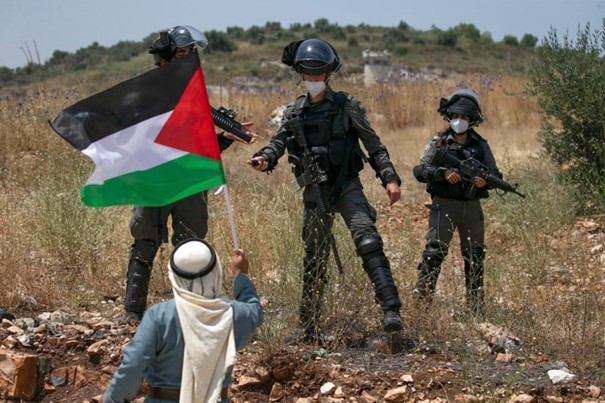 There are precedents for successful unarmed states—but none apply to the Middle East.
There are precedents for successful unarmed states—but none apply to the Middle East.
Israeli Prime Minister Benjamin Netanyahu has long resisted the concept of a two-state solution, but rarely so explicitly as in the months since the Oct. 7, 2023, attack on Israel by Hamas and the subsequent war in Gaza. U.S. President Joe Biden insists, however, that there’s a path forward for an independent Palestine in cooperation with Netanyahu’s government. “I think we’ll be able to work something out … I think there’s ways in which this could work,” Biden recently told reporters, referring to a potential postwar deal that could establish a Palestinian state while also overcoming his Israeli counterpart’s objections.What Biden seemed to have in mind was a Palestinian state that would be both independent and demilitarized. Axios has reported that State Department officials have already been tasked with looking into what a demilitarized Palestine would look like “based on other models from around the world.”
There is growing acceptance of the idea in the international community as a possible way out of the current conundrum—namely, by assuaging Israeli security concerns and handing Palestinians a state of their own to end the cycle of violence. Australian Prime Minister Anthony Albanese has said that Australia may recognize a Palestinian state if it was “demilitarized.”
There even appears to be backing from some significant players in the Arab world. “We are ready for this state to be demilitarized,” said Egyptian President Abdel Fattah al-Sisi during a November 2023 news conference in the presence of the Spanish and Belgian prime ministers. Sisi is a close ally of the United Arab Emirates and Saudi Arabia, which presumably would have been consulted by Cairo.
But a minefield of diplomatic challenges needs to be navigated to make this idea a success. None of the existing states and territories without armed forces compare to the uniquely difficult circumstances faced by Israelis and Palestinians, and none offers a model that can simply be adopted to resolve one of the most intractable conflicts in one of the world’s most restive regions.
Like Lichtenstein or Costa Rica?
Nearly 40 countries and territories do not have a standing army and nearly all are relatively small in size and population. Many are island states, such as Grenada, famous for its nutmeg exports, or Dominica Republic known for its natural hot springs and tropical rainforests. Many have protection from bigger, well-armed states such as the United States, or from NATO for some of those that lie in Europe. Liechtenstein, however, has neither a military nor NATO membership, and yet it indirectly benefits from NATO’s protective umbrella. “If there’s a war, there will be many other countries that will be crossed first,” Liechtenstein’s ambassador to the European Union, Pascal Schafhauser, told Foreign Policy in his office in Brussels. Tucked between Austria and Switzerland, the landlocked nation coordinates policing efforts with its immediate neighbors and is, by default, protected by militarily stronger neighbors such as Germany and France in the extended region. The roughly 40,000 inhabitants of Liechtenstein reside in a peaceful and prosperous region, and they have not yet found a compelling reason to reverse the decision that led to demilitarization of the country in 1868.
Liechtenstein and Palestine, however, could not be any more different. While Liechtenstein’s geography and equally prosperous neighbors guard it from external threats, the Palestinian territories are cheek-to-jowl with Israel—their arch foe. Furthermore, an independent Palestine would still have to reckon with a meddlesome Iran, which is likely to keep aiding nonstate armed groups—such as Hezbollah and the Houthis—in firing rockets at Israel and challenging the stability of any arrangement.
Costa Rica is often hailed as a paragon of development in the Latin American region. While there are many factors behind its success, at least one of them is widely considered to be demilitarization. Back in 1948, Costa Rica abolished the military, and unlike some of its neighbors, it hasn’t been embroiled in coups and military takeovers since. Instead, it has spent the money that would go toward a defense budget on human development. Unlike Palestine, however, none of its neighbors are trying to invade its territory or instigate an armed uprising.
The changing internal security dynamics in Costa Rica nonetheless offer a lesson. In a recent paper titled “The Myth of Demilitarization in Costa Rica,”
Markus Hochmüller and Markus-Michael Müller highlight the fact that crime is on the rise there, and that there are calls to hand increased powers to heavily armed special policing units such as the Fuerza Especial Operativa. This illustrates the danger that even a basic policing structure could be militarized at a later stage.  Anchal Vohra,
Anchal Vohra,
columnist at Foreign Policy.
Illustration near the town of Tulkarm on June 5, 2020.
More on that debate
